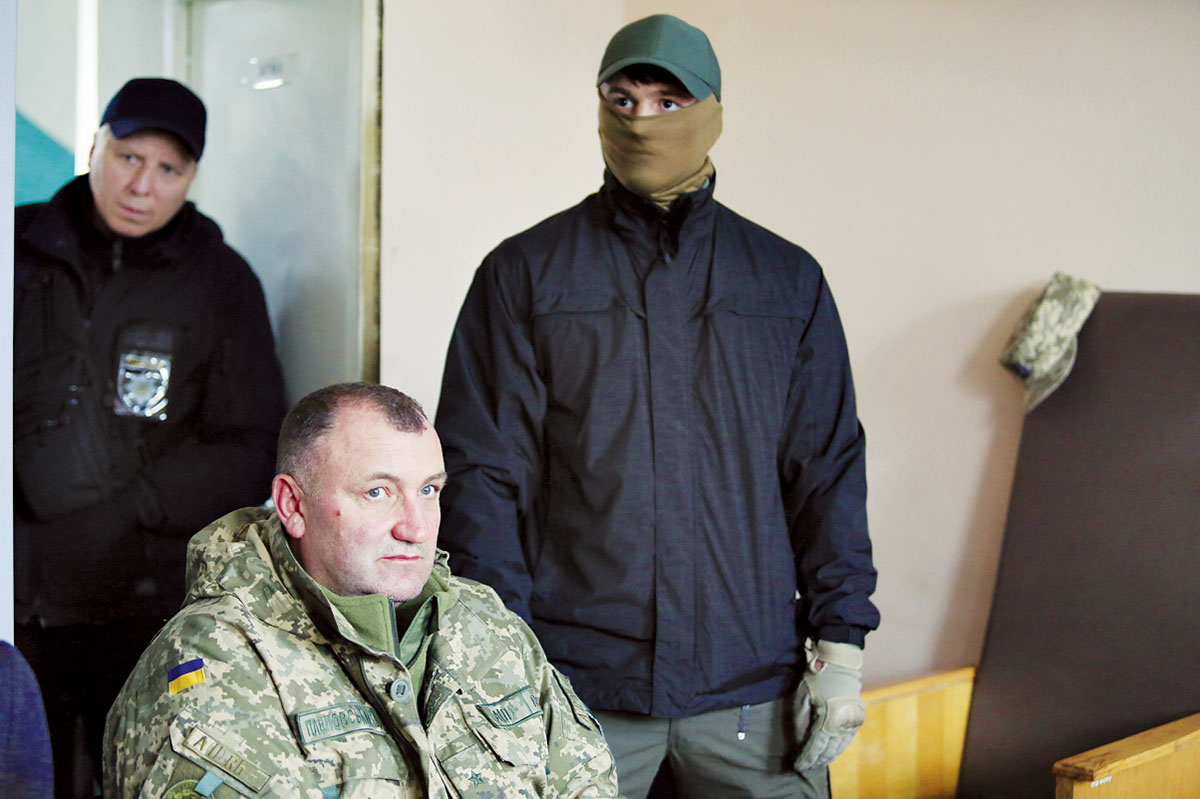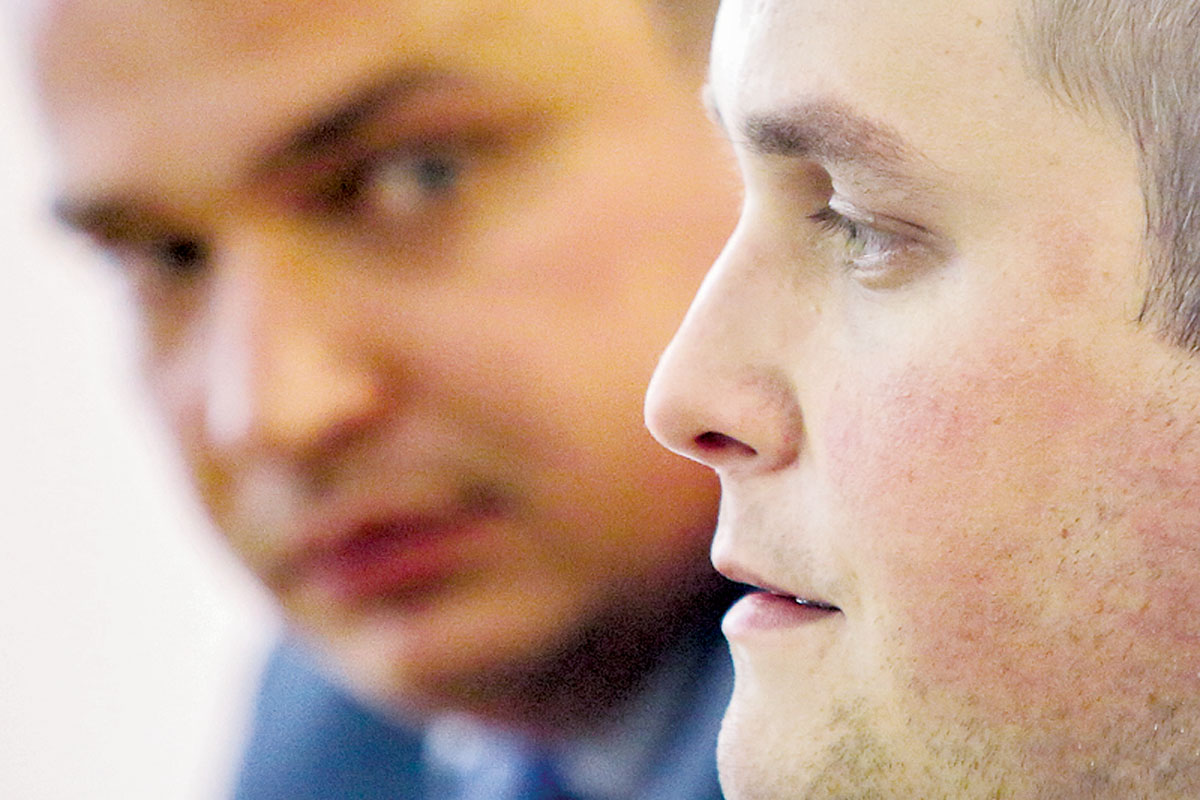In a nation awash in corruption, the scandals are never-ending. Here are 10 major ones in 2017:
1. Prosecutors’ failure
Prosecutor General Yuriy Lutsenko has failed to investigate corruption cases against ex-President Viktor Yanukovych and his allies, cases into the murder of more than 100 protesters during the 2013–2014 EuroMaidan Revolution and other high-profile cases.
Only one top official who served under Yanukovych — ex-Justice Minister Oleksandr Lavrynovych — is currently on trial for graft.
Not a single of the in-absentia corruption cases against Yanukovych and his top officials and not a single in-absentia case against the organizers of EuroMaidan murders have gone to trial.
Lutsenko has also concluded several controversial agreements with Yanukovych allies, including ex-Ecology Minister Mykola Zlochevsky, to close cases against them in exchange for payments to the budget. But the bargains were criticized as an effort to let them escape genuine punishment.
Moreover, Lutsenko has failed to investigate alleged bank fraud worth $20 billion, including $5.6 billion allegedly looted from PrivatBank by its former owner, billionaire oligarch Ihor Kolomoisky, triggering the institution’s takeover by the state.
2. Attack on anti-corruption institutions
Ukraine’s civil society and its Western partners have demanded the creation of an independent anti-corruption court that would be able to judge cases fairly and swiftly.
President Petro Poroshenko had opposed the court’s creation since judicial reform legislation was passed in mid‑2016 but promised to create an anti-corruption court under Western pressure in October. He pledged to submit a bill on such a court several times but missed all of his deadlines, with the next one set for 2018.
Poroshenko and his allies have also tried to restrict the National Anti-Corruption Bureau of Ukraine’s independence.
Pro-government lawmakers on Dec. 6 submitted a bill that would enable parliament to fire NABU chief Artem Sytnyk without an audit of his performance. The bill was later removed from the agenda after Western criticism.
Moreover, in November, the Prosecutor General’s Office and the Security Service of Ukraine disrupted a NABU corruption investigation into the State Migration Service by publishing the personal data of NABU undercover agents, blowing their cover. The agents were arrested and charged with provoking an official to take a bribe.
Pro-government lawmakers have also repeatedly tried to appoint loyal auditors in order to control and potentially fire Sytnyk.
3. Attack on reformers
Reformers and anti-corruption activists have increasingly faced harassment and criminal prosecution.
Ex-top prosecutors Vitaly Kasko and David Sakvarelidze, ex-customs official Yulia Marushevska, NABU deputy chief Gizo Uglava, anti-corruption activist Vitaly Shabunin and ex-Georgian President Mikheil Saakashvili and his allies are being investigated in criminal cases.
Moreover, Kharkiv-based anti-corruption activists Dmytro Bulakh and Yevhen Lisichkin and Poltava-based whistleblower judge Larysa Golnyk were beaten in recent months.
In March the authorities also set draconian asset disclosure requirements for anti-corruption activists that were seen by critics as an effort to intimidate and persecute them.
4. Incumbent corruption
State Fiscal Service Chief Roman Nasirov, ex-People’s Front party lawmaker Mykola Martynenko, Deputy Defense Minister Ihor Pavlovsky and Interior Minister Arsen Avakov’s son Oleksandr have been charged in corruption cases by the NABU this year.
However, chief anti-corruption prosecutor Nazar Kholodnytsky has been accused of blocking many of the NABU’s cases, which he denies. The NABU has also argued that Ukraine’s corrupt judiciary is reluctant to consider its graft cases.
All of the NABU’s cases are likely to go nowhere unless an independent anti-corruption court is created.
Moreover, incumbent lawmakers still have immunity from prosecution. In October parliament sent a bill on lifting lawmakers’ immunity to the Constitutional Court after thousands of protesters demanded this. But the legislation has seen no progress since then.

Deputy Defense Minister Ihor Pavlovsky at the Kyiv’s Solomiansky District Court on Oct. 10. (Oleg Petrasiuk)
5. E-declarations
The National Agency for Preventing Corruption, which is supposed to check officials’ electronic asset declarations, has so far failed to find any criminal or administrative offenses in any of the top officials’ declarations.
Hanna Solomatina and Oksana Divnich, top officials of the NAPC, said on Nov. 15 that the agency is involved in large-scale corruption and completely controlled by the Presidential Administration. The NAPC and the Presidential Administration denied the accusations.
Solomatina on Nov. 24 published what she says is the correspondence in which Oleksiy Horashchenkov, a Presidential Administration official, who is trying to give her orders. The Kyiv Post has also obtained the documents of an audit on which the corruption investigation is based.
The NAPC corruption case on Nov. 28 was transferred on the orders of Kholodnytsky and Lutsenko from the independent NABU to the presidentially controlled SBU, in what critics, including Solomatina, believe to be an effort to destroy the case.
Solomatina said on Dec. 11 that the NAPC’s leadership is currently pressuring, punishing and firing whistleblowers, while a competition commission one of whose members is Horashchenkov is choosing new top NAPC officials. She also said on Dec. 20 that the SBU was not investigating the NAPC corruption case at all, saying that it is not authorized to do so.
The SBU did not respond to a request for comment.
6. Rent-seeking
One of the most prominent rent-seeking schemes is the Rotterdam+ formula, which was introduced last year by the energy regulator headed by Dmytro Vovk, a presidential protégé. The NABU has opened a corruption case into the scheme.
Although the coal is supplied from Russian-occupied areas in the Donbas and Dnipropetrovsk Oblast to other Ukrainian regions, its price includes the cost of alleged shipment from Rotterdam in the Netherlands and is unjustifiably high, according to analysts. As a result, the price of electricity from coal-fueled power plants has more than tripled since 2015. Lawmaker Sergii Leshchenko claims that Poroshenko and tycoon Rinat Akhmetov have reached a deal to introduce the scheme.
Akhmetov’s DTEK energy group has benefited from the high coal and power prices introduced by the Rotterdam+ scheme. DTEK denied accusations of wrongdoing, saying that the energy prices were fair.
7. Corrupt elections
Poroshenko has failed to replace members of the discredited Central Election Commission.
The legal authority of 12 out of the Central Election Commission’s 15 members, including its Chairman Mykhailo Okhendovsky, expired in 2014, but they are still on their jobs.
Okhendovsky, an ex-ally of Yanukovych, has been charged with receiving bribes worth $100,000 in 2010 and $61,000 in 2012 from Yanukovych’s Party of Regions. His name features in the party’s alleged off-the-book ledgers published last year.
Meanwhile, in November, parliament passed the first reading of a bill introducing a fairer electoral system under protesters’ pressure after dragging its feet for years. It is unclear if it will be passed into law.
The election bill seeks to scrap single-mandate election districts and leave only party-list proportional representation. Single-mandate districts are seen as a major vehicle of political corruption in Ukraine, with wealthy candidates buying votes in their constituencies.
8. Undercover operations
Sytnyk on Dec. 1 said that the Security Service of Ukraine, or SBU, and the Prosecutor General’s Office had foiled all NABU undercover operations by detaining and illegally publishing the personal data of NABU undercover agents involved in a corruption case into the State Migration Service and obstructing the case. Several of the agents were charged with provoking Dina Pimakhova, first deputy head of the State Migration Service, to solicit a $30,000 bribe, which the bureau denies.
The NABU published a recording of Pimakhova, who denies the accusations, discussing the bribe.
The SBU and the Prosecutor General’s Office denied the accusations of wrongdoing.

Artem Sytnyk, head of the National Anti-Corruption Bureau (L) and Nazar Kholodnytsky, Ukraine’s chief anti-corruption prosecutor, speak with journalists during their press conference on July 1. (Volodymyr Petrov)
9. War profiteering
The NABU on Oct. 11 arrested Deputy Defense Minister Ihor Pavlovsky and Volodymyr Hulyevych, head of the ministry’s procurement department. They were placed by a court under house arrest.
They are suspected of embezzling Hr 149 million through the purchase of fuel at inflated prices for the Defense Ministry and deny the charges.
Lawmaker Oleksandr Hranovsky, a top ally of Poroshenko, has also been accused of being involved in the scheme, although he denies the charges.
Associates of Poroshenko, including Oleh Hladkovsky, are accused of profiteering from the defense industry and deny the accusations.
The NABU is also investigating a graft case into Kyiv’s Rybalsky Kuznya shipyard, which is owned by Poroshenko and his top ally and lawmaker Ihor Kononenko.
10. Collapse of investigations
All high-profile investigations face total collapse, according to experts from the Reanimation Package of Reforms and other critics.
First, prosecutors legally had to transfer their cases to the State Investigation Bureau, which has not even been created yet. As a result, many cases are paralyzed.
Second, Lutsenko is planning to transfer top-level graft investigations to the NABU, overloading its tiny staff with work, effectively burying it with cases.
Third, procedural code amendments signed by Poroshenko on Nov. 22 make it much more difficult or even impossible to conduct criminal investigations in many cases, critics argue.
